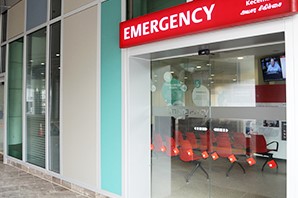We will NEVER ask you to transfer money or disclose bank details over a call. If in doubt, call the 24/7 ScamShield helpline at 1799, or visit the ScamShield website at www.scamshield.gov.sg.
A trip to the Emergency Department may be one filled with uncertainty. Our team recognises this and tries its best to make the visit as comfortable as possible for our patients and their loved ones.
NTFGH's Emergency Department is staffed with 24-hour specialist coverage to oversee and manage acute emergencies. Our team of Emergency Medicine specialists, nurses and Patient Service Associates is experienced and well-equipped to provide one-stop care to anyone seeking emergency medical help.
NTFGH is part of the National University Health System (NUHS) and works closely with National University Hospital (NUH) in the management of time-sensitive emergencies, such as stroke and heart attacks, and also paediatric/gynaecology emergencies. By pooling our expertise and resources, we are able to save precious time and ensure continuity of care.
The Emergency Department in NTFGH is designed around patients’ needs to reduce waiting time through a more efficient workflow. Elder-friendly features also help improve comfort and reduce anxiety. Additionally, it is pandemic-prepared, mass-casualty and decontamination-ready.
Patients suffering from asthma and chronic obstructive pulmonary disease (COPD) are given the option of non-invasive ventilation. Our Emergency Department is one of the few in Singapore that offers this service.
Our Emergency Department is also one of the few in Singapore that offers an Extended Diagnostic Treatment Unit (EDTU) manned by emergency specialists. This 24-hour short-stay ward provides transitional care for patients who are no longer in a critical condition but still require extended observation.
Our 24-hour one-stop Emergency Department handles the following emergencies.
Our Emergency Department assesses and treats patients with general medical and surgical emergencies.
We provide basic care for all cardiovascular emergencies including physical examination, ECG, X-ray, blood investigation and basic supportive treatment.
Our team collaborates closely with National University Hospital. Patients requiring thrombolytic (clot busting) therapy and preparatory care prior to acute percutaneous angioplasty (ballooning) will be transferred to NUH seamlessly.
We are equipped with the necessary resuscitation equipment to provide medical treatment for accident patients with major trauma. This includes resuscitation and other basic trauma treatment procedures such as suturing, basic care of wounds and setting of simple fractures and dislocations. With multi-disciplinary trauma resuscitation capabilities, major procedures are initiated within the Emergency Department before the patient is sent to the operating theatre.
We provide emergency care for patients who suffer from any form of poisoning or toxic exposure.
As the Emergency Department is often the first point of contact for patients in a hospital, our Emergency Medicine department liaises closely with the Ministry of Health's Emergency Preparedness branch to coordinate pandemic and emergency workflows within the hospital.
Patients admitted with contagious diseases are treated in our negative pressure isolation rooms.
Bleeding from the gastrointestinal tract is a potentially life-threatening condition. Patients with gastro-intestinal tract bleeding have to be resuscitated before emergency endoscopy is carried out to identify the source of the bleeding and stop the bleeding.
Patients who arrive at the Emergency Department in an urgent or critical condition are given priority for CT and MRI services, which would help our doctors to make informed decisions on the patient's treatment plan.
Our partnership with NUH allows us to provide timely treatment for specialised conditions. Patients with the following conditions will be stabilised and transferred to NUH for further care. This includes children under 12 years old as we do not have specialised nor inpatient paediatric services to treat young patients.

Mon - Sun & PH: 24hrs
Ng Teng Fong General Hospital
Tower B - Wards
Level 1